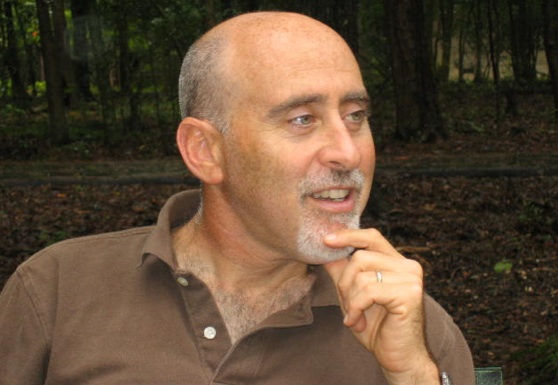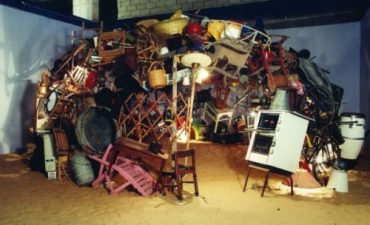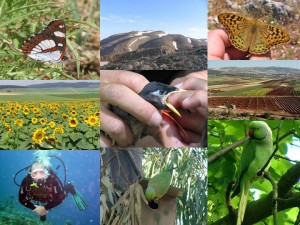
Joshua interviews Israel’s most influential and accomplished environmentalist, Dr. Alon Tal. Where is Israel at in terms of environmental protection? Get the scoop here.
Israel has introduced several environmental protections in the last few years, but many problems remain. Although massive social protests swept Israel over the summer, environmental issues were not at the fore. So who is paying attention? Dr. Alon Tal, a lawyer, is a professor in the School of Desert Studies at Ben Gurion University. He has been active in Israel’s environmental movement for more than two decades. Dr. Tal founded the Arava Institute for Environmental Studies and the Israeli Union for Environmental Defense. He is co-chairman of the Green Movement, Israel’s Green Party, which is projected to win 3 seats in the next Knesset election. Currently on sabbatical at Stanford University, Dr. Tal is writing a book about Israeli forestry policy. We caught up with him to discuss what the Israeli government has – and hasn’t – done to prioritize environmental protections.
Joshua: What are the greatest threats to the environment in Israel right now?
Dr. Tal: To begin with, I believe that it’s important that we think systematically about Israel’s environmental problems and distinguish between symptoms and causes. With regards to symptoms – there are three key threats that I would highlight.
First, the steady loss of open spaces continues to lead to the decimation of Israeli wildlife. Although the country was blessed with remarkable biodiversity due to its rain gradient and location straddling three continents, nature is paying a huge price to the style and pace of land development.
Over half of the mammal populations are declining, many bird species have stopped reproducing and it is quite likely that within a decade there simply won’t be any amphibians in the wild.
Second, the public health insult from air pollution, especially in the Haifa bay, remains astonishing. A recent study showed that there are about fifty to sixty cases of lymphatic cancer every year there when statistically there should be no more than twelve.
Breast cancer has reached an epidemic status there, as women have significantly higher rates (roughly 50%) than the national and international norm.
And if we start to consider the chronic health effects, especially among children with respiratory disease, asthma, etc., around the country, we can see that although there are some improvements in the ambient air conditions, we have far to go before the new Clean Air Law begins to deliver some real results.
Third, I think we have to realize that the Israeli environment is part of the international environment – and global trends affect it. As the world continues to muddle in efforts to combat climate change, weather conditions in Israel are changing. Temperatures are higher; rain events are more ferocious; fires in our forests are more common and more vicious. Israel’s present government considered climate policy and basically decided not to take responsibility and to let our short-term concerns about economics trump any long-term consideration for the planet and future generations.
In other words, Israel looked at its rising annual emissions of greenhouse gases and decided that renewable energy and energy conservation were simply not a real priority. The policies adopted are extremely unambitious and will not lead to meaningful changes.
I expected the Jewish state to take a more principled and ethical position regarding the world’s paramount ecological challenge. Why can’t Israel be the first carbon neutral nation and lead the world in solar energy? [Israel’s First Prime Minister] David Ben Gurion had that kind of vision and leadership, and I miss it.
Joshua: What, if anything, did the social protest movement hope to achieve in terms of environmental protections? Did it have any success?
Dr. Tal: There was an important moment during the tumultuous summer events where we felt that an environmental message was getting through to the social protesters. Unanimously, they opposed the legislation that circumvents the planning and building law and removes much of the procedural protection for open spaces.
They realized that flooding the housing market was not the way – as most of those homes wouldn’t be affordable anyway and that quality of life also meant quality of the environment. The law ultimately passed, but the social movement did not buy into Netanyahu’s simplistic solutions that will ultimately benefit the construction moguls and those who can afford expensive homes.
The jury is still out but at present I’m a bit disappointed in the actual outcomes of the summer protests. There are a few isolated achievements – say like better pay for starting policemen, but on the whole I don’t see the indicators changing and the tax system remains part of the problem. For real change, you need a whole new perspective, which I believe that the Green Movement has put out there with its “New Green Deal” proposals. For instance, we need to start taxing “bad things” like pollution and reducing taxes on “good things” like work.
But I think that the biggest success of the summer is in the general awareness about the importance of the “Commons”. The Green Movement has been talking about the “Commons” – the many public goods that belong to nobody and belong to everybody – for some time and warned that they have been steadily eroding in Israel.
Now we know that the public is unhappy about this trend. This could be clean air, or it could be good public school education or beaches – but it all amounts to the same thing. There is a role for government in ensuring that these critical public assets are not privatized and sold off to an increasingly small elite of Israeli society.
We’re not calling for Socialism. No one wants to go back there. But there is a more equitable and responsible way to govern. After this summer, I am confident that the public gets this message and I expect to see electoral ramifications down the road. From the present political players I expect very little as the perspectives informing both Likud and Kadima, the two major political parties, are part of the problem and their leaders remain clueless.
Joshua: How have recent efforts such as the Samar Dunes campaign shaped attempts to preserve natural areas in Israel?
Dr. Tal: Well, it’s been a mixed record recently. We did well in [the campaigns to save] Palmachim and Betzet beaches but appear to be losing in critical campaigns like the Jerusalem Forest and the Samar Sand Dunes.
It breaks my heart that [sand from Samar] is going to be sold off so that we can lower [development] costs by a fraction in the south of Israel for a couple of years. It’s the last serious ecosystem of its kind left in Israel and some of those species don’t exist anywhere else on the planet. It is just lunacy not to drive down sand from an hour or two away and leave this resource for nature and recreation.
So I think that the efforts show that although the environmental movement can change the opinion of Minister of Environment Gilad Erdan, who usually takes the right positions. But his influence is extremely limited. His party and its appointments consistently oppose him and more often than not we see that he simply lacks the authority or leadership needed to save these resources for the future and Israel’s environment loses as a result. This dynamic has convinced me and many other environmentalists that only a Green Party that uses its power to ensure social and environmental justice can really lead to systemic change.
Joshua: In your book “Pollution in a Promised Land“, you chronicle Israel’s history of air and water pollution. What has Israel done recently to combat these problems?
Dr. Tal: Air pollution might get a little bit better with the implementation of the Clean Air Law which recently came into force. The law is quite advanced and promises better local involvement, tougher standards and broader tools for regulation. But since the 1960s there was a reasonable air pollution law which could have attained much more. So without enforcement it’s not clear that the promise of the new legislation will be achieved. And the law will not make much difference at all for greenhouse gas emissions and climate change measures. With regards to water pollution, we have seen improvements in sewage treatment, but still lack a real strategy for restoring our contaminated aquifers and surface waters.
Joshua: What recent developments give you hope for the movement going forward?
Dr. Tal: Well, I look forward to very successful campaigns in local elections across the country. I believe that at the level of City Councils, the environment and social conditions are issues which engage a large segment of the public and we should see green lists succeeding even more than today where about 40 representatives in city councils are actively identified with green parties.
In the last national election, the Green Movement had only been in existence formally for four months. We had enough votes for one seat, but unfortunately, the law says you need two. The War in Gaza and the dynamics between Bibi and Tzipi Livni hurt us. But today, many people come to me and tell me how much they regret not voting for us and having at least a few people in the Knesset who share their values. I think it’s important that Israel’s green party sport a new, challenging, Zionist agenda that young people can get excited about and reinvigorate their enthusiasm for the great national project that we undertake.
Coming after the summer protest where the public is looking for a change, I believe we will join the nations of Europe and become an integral part of the political mosaic. At that time, we can finally make environmental interests and sustainability not only the “hobby” of a conscientious Member of Knesset, but a serious part of the negotiations that take place as the society decides its priorities. We can represent that voice which at present remains neglected.



